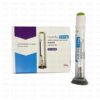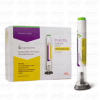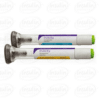The 2x Referral Bonus Event Is Now On! More Info ➡️
Home » Medication » Trulicity » Trulicity Dulaglutide
SAVE 10% OFF First Order With Coupon Code: WELCOME10



Our Price: $294.99

Step 1
Place Your Prescribed Trulicity Dosage In Your Cart
Step 2
Complete Checkout
Step 3
Upload Your Trulicity Prescription
(Shipping takes approximately 4-10 business days. A tracking number will be provided)
Trulicity carries a risk of thyroid C-cell tumors, including medullary thyroid carcinoma (MTC). Patients with a personal or family history of MTC or Multiple Endocrine Neoplasia syndrome type 2 (MEN 2) should not use this medication. Regular monitoring for symptoms of thyroid tumors, such as a lump in the neck or hoarseness, is recommended.
Trulicity may cause tumors in the thyroid, like thyroid cancer. Watch for possible symptoms, such as a lump or swelling in the neck, trouble swallowing, hoarseness, or shortness of breath. If you have a symptom, tell your doctor.
Ensure you speak to your doctor about any medication or supplements you take, including insulin, vitamins, thiazolidinediones, over-the-counter medication, minerals, and supplements.
Similar to taking any insulin medication, Trulicity may have side effects that range from mild to severe. The information below does not cover all side effects experienced by those who have taken this medication.
To familiarize yourself with all side effects, read the patient guides and speak to your doctor or pharmacists about the possible risks. Your doctor may adjust your dosage and provide tips on how to deal with side effects.
The more common side effects experienced when taking Trulicity include diarrhea, fatigue, nausea, constipation, vomiting, abdominal pain and decreased appetite.
Typically these side effects go away within a few days or weeks. Consult your doctor if these side effects worsen or do not go away.
Ask your doctor how to recognize the severe side effects below and what to do if you think you have one:
Stop using Trulicity and call your healthcare provider right away if you have severe pain in your stomach area (abdomen), with or without vomiting, that will not go away. You may feel pain from your waist to your back.
Tell your healthcare provider if you have changes in your eyesight (vision) during treatment with Trulicity.
Signs and symptoms of low blood sugar may include dizziness or light-headedness, confusion or drowsiness, headache, blurred vision, slurred speech, fast heartbeat, sweating, hunger, shakiness, feeling jittery, weakness, anxiety, irritability, or mood changes.
Stop using Trulicity and get medical help right away if you have any symptoms of a severe allergic reaction, which may include: swelling of your face, lips, tongue, or throat, problems breathing or swallowing, severe rash or itching, fainting, or feeling dizzy, or very rapid heartbeat.
In people with kidney problems, diarrhea, nausea, and vomiting may cause a loss of fluids (dehydration), which may cause kidney problems to worsen.
Administer Trulicity once weekly, at any time of day, and with or without food.
Inject Trulicity subcutaneously in the abdomen, thigh, or upper arm. Rotate injection sites with each dose.
Check Trulicity visually before use. The medicine should appear clear and colorless. Do not use the drug if particulate matter or coloration is seen.
When using Trulicity with insulin, administer as separate injections and never mix them together. It is acceptable to inject Trulicity and insulin in the same body region, but the injections should not be next to each other because this may cause discomfort or confusion if there is a reaction.

Trulicity is not approved to be used by anyone under 18 years of age.
Each Trulicity injection pen is prefilled for one use only. The pen should be disposed of after use, even if there is still medication inside.
Keep the medication away from children and pets.
Before using Trulicity:
Trulicity is administered by injection taken subcutaneously (under the skin). Each dose should be taken at the same time of day once per week.
Trulicity can be taken with or without meals.
A healthcare professional like your doctor or nurse will show you how to inject correctly. Rotate injection sites and avoid injecting into the same area twice, as this can lead to complications.
Trulicity is contraindicated in patients with a personal or family history of MTC, patients with MEN 2, and patients with a prior severe hypersensitivity reaction to dulaglutide or any of the product components.
Cases of MTC in patients treated with liraglutide, another GLP-1 receptor agonist (GLP-1 RA), have been reported in the postmarketing period; the data in these reports are insufficient to establish or exclude a causal relationship between MTC and GLP-1 RA use in humans. If serum calcitonin is measured and found to be elevated or thyroid nodules are noted on physical examination or neck imaging, the patient should be further evaluated.
Pancreatitis has been reported in clinical trials. Observe patients for signs and symptoms, including persistent severe abdominal pain, sometimes radiating to the back, which may or may not be accompanied by vomiting. If pancreatitis is suspected, discontinue Trulicity promptly. Do not restart if pancreatitis is confirmed. Consider other antidiabetic therapies in patients with a history of pancreatitis.
Patients receiving Trulicity in combination with an insulin secretagogue (e.g. sulfonylurea) or insulin may have an increased risk of hypoglycemia, including severe hypoglycemia. The risk of hypoglycemia may be lowered by a reduction in the dose of sulfonylurea (or other concomitantly administered insulin secretagogue) or insulin. Inform patients using these concomitant medications of the risk of hypoglycemia and educate them on the signs and symptoms of hypoglycemia.
There have been postmarketing reports of serious hypersensitivity reactions (eg, anaphylactic reactions and angioedema) in patients treated with Trulicity. Instruct patients who experience symptoms to discontinue Trulicity and promptly seek medical advice. Use caution in a patient with a history of angioedema or anaphylaxis with another GLP-1 receptor agonist as it is unknown whether they will be predisposed to anaphylaxis with Trulicity.
In patients treated with GLP-1 RAs, there have been postmarketing reports of acute renal failure and worsening of chronic renal failure, sometimes requiring hemodialysis. A majority of reported events occurred in patients who had experienced nausea, vomiting, diarrhea, or dehydration. In patients with renal impairment, use caution when initiating or escalating doses of Trulicity and monitor renal function in patients experiencing severe adverse gastrointestinal reactions.
Use of Trulicity may be associated with gastrointestinal adverse reactions, sometimes severe. Trulicity has not been studied in patients with severe gastrointestinal disease, including severe gastroparesis, and is therefore not recommended in these patients.
Have been reported in a cardiovascular outcomes trial. Monitor patients with a history of diabetic retinopathy.
There is limited data regarding the use of Trulicity in pregnant women. As a result, there is not sufficient evidence to determine a drug-associated risk for significant congenital disabilities and miscarriage. There are clinical considerations regarding the risks of poorly controlled diabetes in pregnancy. Based on animal reproduction studies, there may be risks to the fetus from exposure to dulaglutide during pregnancy. Trulicity should be used during pregnancy only if the potential benefit justifies the potential risk to the fetus.
In pregnant rats administered dulaglutide during organogenesis, early embryonic deaths, fetal growth reductions, and fetal abnormalities occurred at systemic exposures at least six times human exposure at the maximum recommended human dose (MRHD) of 4.5 mg/week. In pregnant rabbits administered dulaglutide during organogenesis, major fetal abnormalities occurred at five times human exposure at the MRHD. Adverse embryo/fetal effects in animals were associated with decreased maternal weight and food consumption attributed to the pharmacology of dulaglutide.
The estimated background risk of major congenital disabilities is 6–10% in women with pre-gestational diabetes with an HbA1c >7% and has been reported to be as high as 20–25% in women with an HbA1c >10%. The estimated background risk of miscarriage for the indicated population is unknown. In the U.S. general population, the estimated background risk of major congenital disabilities and miscarriage in clinically recognized pregnancies is 2–4% and 15–20%, respectively.
If a dose is missed, instruct patients to administer it as soon as possible if there are at least 3 days (72 hours) until the next scheduled dose. If less than 3 days remain before the next scheduled dose, skip the missed dose and administer the next dose on the regularly scheduled day. In each case, patients can then resume their regular once-weekly dosing schedule.
Overdoses have been reported in clinical studies. Effects associated with these overdoses were primarily mild or moderate gastrointestinal events (e.g., nausea, vomiting) and non-severe hypoglycemia. In the event of an overdose, appropriate supportive care (including frequent glucose monitoring) should be initiated according to the patient’s clinical signs and symptoms.
The effectiveness of this medication can depend on how and where it’s stored.
Trulicity should be stored in a refrigerator in its original packaging or at room temperature (no higher than 86°F/30°C).
Do not freeze or store medication near the cooling element.
Throw away if medication becomes frozen, and do not use if previously frozen.
Keep medication within the expiration date that should be found on the label. Trulicity may be stored at room temperature for up to 2 weeks (14 days).
Immediately after use, dispose of used pens in an FDA-cleared sharps disposal container. You should not throw away (dispose of) Pens in your household trash.
In the absence of an FDA-cleared sharps disposal container, you may use a household container that is:
As soon as your sharps disposal container is nearly full, you must dispose of it according to your community’s guidelines. Used needles and syringes may be disposed of according to state or local laws. For more information about safe sharps disposal and information specific to your state, visit the FDA website at http://www.fda.gov/safesharpsdisposal.
Do not recycle sharps disposal containers.
At Insulin Outlet, we ensure the safety and quality of our medications, meeting all federal legislation standards. Your order will be dispatched from a reputable licensed Canadian pharmacy, guaranteeing the highest standards of reliability and authenticity. This medication has been approved by Health Canada (Canada's FDA) and is identical to what you would receive in the US, only with Canadian labeling and packaging. We do not sell counterfeit or unauthorized medications. Our discounted medications are shipped directly from Canada to your doorstep, providing a fast and secure delivery experience. To conveniently buy Trulicity online at a significant discount, place your order above or call us at 1-888-238-0872.
